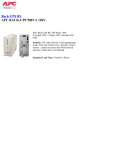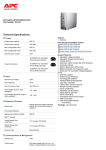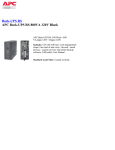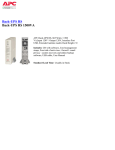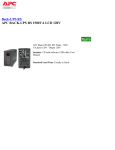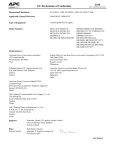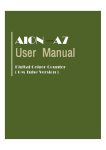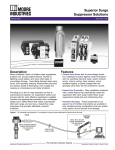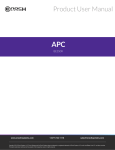Download Back-UPS RS APC BACK-UPS RS 800VA 230V
Transcript
Back-UPS RS APC BACK-UPS RS 800VA 230V APC Back-UPS RS, 540 Watts / 800 VA,Input 230V / Output 230V, Interface Port USB Includes: CD with software, Cord management straps, Documentation CD, Qty 2 - Detachable IEC C13 to IEC C14 power cords, Telephone Cable, USB cable, User Manual, Wall-mounting template Standard Lead Time: Usually in Stock BR800I Features Serial Connectivity USB Connectivity Serial Connectivity Use any Home Automation network to monitor and control the S20 through its RS-232 serial port. For information on how to communicate with the S20, see APC's Application Note #102. Crestron and AMX installers should visit their respective websites for information on how to integrate the S20 into those networks. Provides management of the UPS via a USB port (not available on all models). Provides management of the UPS via a serial port. Back-UPS RS Features & Benefits Protection Battery-protected and Reserves power capacity and run time for connected equipment that require surge-only outlets battery back-up while providing surge only protection for less critical equipment Boost and Trim Gives higher application availability by correcting low and high voltage Automatic Voltage conditions without using the battery. Regulation (AVR) Provides protection of connected equipment from power surges on the data Data line surge protection lines. Safety-agency Ensures the product has been tested and approved to work safely with the approved connected service provider equipment and within the specified environment. UL, FCC, CE, C-Tick approvals. Power conditioning Protects connected loads from surges, spikes, lightning, and other power disturbances. Convenience Audible Alarms Automatic restart of loads after UPS shutdown Automatic self-test Battery replacement without tools LED status indicators Cold-start capable Hot-swappable batteries Resettable circuit breakers Transformer-block spaced outlets Provides notification of changing utility power and UPS conditions. Automatically starts up the connected equipment upon the return of utility power. Periodic battery self-test ensures early detection of a battery that needs to be replaced. Allows quick, easy battery replacement. Quickly understand unit and power status with visual indicators. Provides temporary battery power when the utility power is out. Ensures clean, uninterrupted power to protected equipment while batteries are being replaced Enables a quick recovery from overload events. Protect equipment with input transformer blocks without blocking access to other receptacles. User-replaceable batteries Increases availability by allowing a trained user to perform upgrades and replacements of the batteries reducing Mean Time to Repair (MTTR) Manageability Adjustable voltage sensitivity Adjustable voltagetransfer points Serial Connectivity USB Connectivity Multiple mounting methods Intelligent Battery Management Provides the ability to adapt the UPS for optimal performance in specific power environments or generator applications. Maximizes useful battery life by widening the input voltage window or tightening the output voltage regulation. Provides management of the UPS via a serial port. Provides management of the UPS via a USB port (not available on all models). Allows for standardization on one product for use in different environments. Micro-processor controlled battery charging and diagnostic testing ensures maximum battery life. Output Output Power Capacity 540 Watts / 800 VA Max Configurable Power 540 Watts / 800 VA Nominal Output Voltage 230V Output Connections (2) IEC 320 C13 (Surge Protection) (4) IEC 320 C13 (Battery Backup) Input Nominal Input Voltage 230V Input Frequency 47 - 63 Hz Input Connections IEC-320 C14 Cord Length 1.83 meters Input voltage range for main operations 175 - 295V Input voltage adjustable range for 160 - 300V mains operation Batteries & Runtime Battery Type Maintenance-free sealed Lead-Acid battery with suspended electrolyte : leakproof Included Battery Modules 1 Typical recharge time 8 hour(s) Replacement Battery RBC32 RBC™ Quantity 1 Typical Backup Time at Half Load 17.8 minutes (270 Watts) Typical Backup Time at Full Load 5.3 minutes (540 Watts) Runtime Chart Back-UPS RS Energy Use/Efficiency Curve fit to measured efficiency data. All measurements taken in normal operating mode, at typical environmental conditions, with nominal electrical input and resistive load output. View Enlarged Chart Communications & Management Interface Port(s) USB Control panel LED status display with On Line : On Battery : Replace Battery and Overload indicators Audible Alarm Alarm when on battery : distinctive low battery alarm : configurable delays Surge Protection and Filtering Surge energy rating 320 Joules Filtering Full time multi-pole noise filtering : 5% IEEE surge let-through : zero clamping response time : meets UL 1449 Data Line Protection RJ-11 Modem/Fax/DSL protection (two wire single line),RJ45 10/100 Base-T Ethernet protection Physical Maximum Height 229.00 mm Maximum Width 102.00 mm Maximum Depth 324.00 mm Net Weight 9.32 KG Shipping Weight 10.23 KG Shipping Height 305.00 mm Shipping Width 229.00 mm Shipping Depth 432.00 mm Master Carton Units 2.00 Master Carton Weight 48.00 lbs. Color Beige SCC Codes 0073130419246 6 Units per Pallet 40.00 Environmental Operating Environment 0 - 40 °C Operating Relative Humidity 0% Operating Elevation 0-3000 meters Storage Temperature -5 - 45 °C Storage Relative Humidity 0% Storage Elevation 0-15000 meters Audible noise at 1 meter from surface of unit 45.00 dBA Online Thermal Dissipation 170.00 BTU/hr Conformance Regulatory Approvals A-tick,C-tick,CE,GOST,GS Mark,VDE Standard Warranty 2 years repair or replace ROHS/WEEE Compliance RoHS **The time to recharge to 90% of full battery capacity following a discharge to shutdown using a load rated for 1/2 the full load rating of the UPS. SPECIFICATIONS TROUBLESHOOTING SERVICE If the Back-UPS arrived damaged, notify the carrier. Problem Back-UPS will not switch on. Possible Cause Item Corrective Action Back-UPS not connected to AC power source. Ensure the Back-UPS is securely connected to an AC outlet. Back-UPS circuit breaker “tripped”. Disconnect non-essential equipment from the Back-UPS. Reset (push in) the rear panel circuit breaker. Switch on the Back-UPS and plug in devices one at a time. If the circuit breaker trips again, disconnect the device that caused the breaker to trip. Utility input voltage quality is out of range. Consider adjusting the transfer voltage and sensitivity. See Transfer Voltage and Sensitivity Adjustment. Specification On-line Input Voltage Range (default settings) 176 - 294 Vac Automatic Voltage Regulation (AVR) +12% On-line Frequency Range 47 - 63 Hz (autosensing) On-battery Waveshape Stepped Sine Wave Maximum Load 800 VA - 540 W Internal battery cartridge is not connected. Connect battery cartridge (see Connect Battery Cartridge). Typical Recharge Time 8 Hours Back-UPS does not power essential equipment during an outage. Equipment plugged into a Surge Only outlet. Unplug device from 'Surge Only' outlet and move to a 'Battery Backup' outlet. Operating Temperature o Back-UPS operates on battery although utility power exists. Back-UPS circuit breaker “tripped”. Disconnect non-essential equipment from the Back-UPS. Reset (push in) the rear panel circuit breaker. Switch the Back-UPS on and plug equipment in one-at-a-time. If the circuit breaker trips again, disconnect the device that caused the breaker to trip. Storage Temperature 0 to 40oC (32o to 104oF) -5o to 45oC (23o to 113oF) Operating / Storage Relative Humidity 0 to 95% non-condensing Utility input voltage quality is out of range. Consider adjusting the transfer voltage and sensitivity. See Transfer Voltage and Sensitivity Adjustment. Size (H x W x D) Back-UPS is heavily loaded. Unplug non-essential equipment (printers, scanners, etc) from the Battery Backup outlets and plug into 'Surge Only' outlets. Weight 9.3 kg (20.5 lbs) Back-UPS battery cartridge is discharged due to recent power outage and has not had time to recharge. Charge the battery cartridge for 8 hours. Back-UPS runtime is reduced until the battery cartridge is fully charged. Shipping Weight 9.9 kg (22 lbs) EMI Classification Battery has reached the end of its life. Replace battery cartridge (see Order Replacement Battery Cartridge). Red Replace Battery indicator is flashing. Green On Line indicator is on. Internal battery cartridge is not connected. Connect battery cartridge (see Connect Battery Cartridge). Red Replace Battery indicator is on. Battery has reached the end of its life. Replace the battery cartridge (see Order Replacement Battery Cartridge). Red Overload indicator is on or flashing. Connected equipment is drawing more power than the Back-UPS can provide. Move one or more equipment power plugs from Battery Backup outlets to Surge Only outlets. Green On Line indicator is on and all other front panel indicators are flashing. Internal UPS fault. Contact APC Technical Support (see Contact Information). Back-UPS does not provide expected backup time. ORDER REPLACEMENT BATTERY CARTRIDGE The battery cartridge typically lasts 3-6 years, shorter if subjected to frequent outages or elevated temperatures. Order part number RBC32. Please recycle spent battery cartridges. REPLACE BATTERY CARTRIDGE 1 2 23 x 10 x 32 cm (9 x 4 x 12.75 inch) EN 50091-1, EN 60950, EN 50091-2, EN 61000-3-2, EN 6100-3-3, EN 55022 Class B On Battery Run-Time TRANSFER VOLTAGE AND SENSITIVITY ADJUSTMENT In situations where the Back-UPS or connected equipment appears too sensitive to input voltage, it may be necessary to adjust the transfer voltage. This is a simple task requiring use of the front panel pushbutton. To adjust the transfer voltage, proceed as follows: 1. Plug the Back-UPS into the utility power source. The Back-UPS will be in a Standby Mode (no indicators lit). 2. Press the front panel pushbutton fully inward for 10 seconds. All indicators on the Back-UPS will flash to acknowledge going into Programming Mode. 3. The Back-UPS will then indicate its current Sensitivity Setting, as shown in the following table. Indicators Flashing Sensitivity Setting 1 (yellow) Low Input Voltage Range (for utility operation) 156 - 300 Vac Input voltage is extremely low or high. Not recommended for computer loads. 2 Medium 176 - 294 Vac (yellow, (factory default) and red) 3 4 3 (yellow, red, and red) High Use When Back-UPS frequently goes On Battery. 176 - 288 Vac Connected equipment is sensitive to voltage fluctuations (recommended). 4. To select the Low Sensitivity setting, press the pushbutton until the yellow indicator is flashing. 5. To select the Medium Sensitivity setting, press the pushbutton until the yellow and red indicators (second and third from the top) are flashing. 6. To select the High Sensitivity setting, press the pushbutton until yellow and both red indicators (bottom three) are flashing. 7. To exit without changing the Sensitivity Setting, press the pushbutton until the green indicator is flashing. 8. Once in Programming Mode, if the pushbutton is not pressed within 5 seconds, the Back-UPS will exit Programming Mode; all indicators will extinguish. If the Back-UPS requires service, do not return it to the dealer. The following steps should be taken: 1. 2. 3. 4. Consult the Troubleshooting section to eliminate common problems. If the problem persists, go to http://www.apc.com/support/. If the problem still persists, contact APC Technical Support. Have the Back-UPS model number, serial number and date of purchase available. Be prepared to troubleshoot the problem with an APC Technical Support representative. If this is not successful, APC will issue a Return Merchandise Authorization (RMA) number and a shipping address. LIMITED WARRANTY The standard warranty is two (2) years from the date of purchase. APC’s standard procedure is to replace the original unit with a factory reconditioned unit. Customers who must have the original unit back due to the assignment of asset tags and set depreciation schedules must declare such a need at first contact with an APC Technical Support representative. APC will ship the replacement unit once the defective unit has been received by the repair department, or cross-ship upon the receipt of a valid credit card number. The customer pays for shipping the unit to APC. APC pays ground freight transportation costs to ship the replacement unit to the customer.







